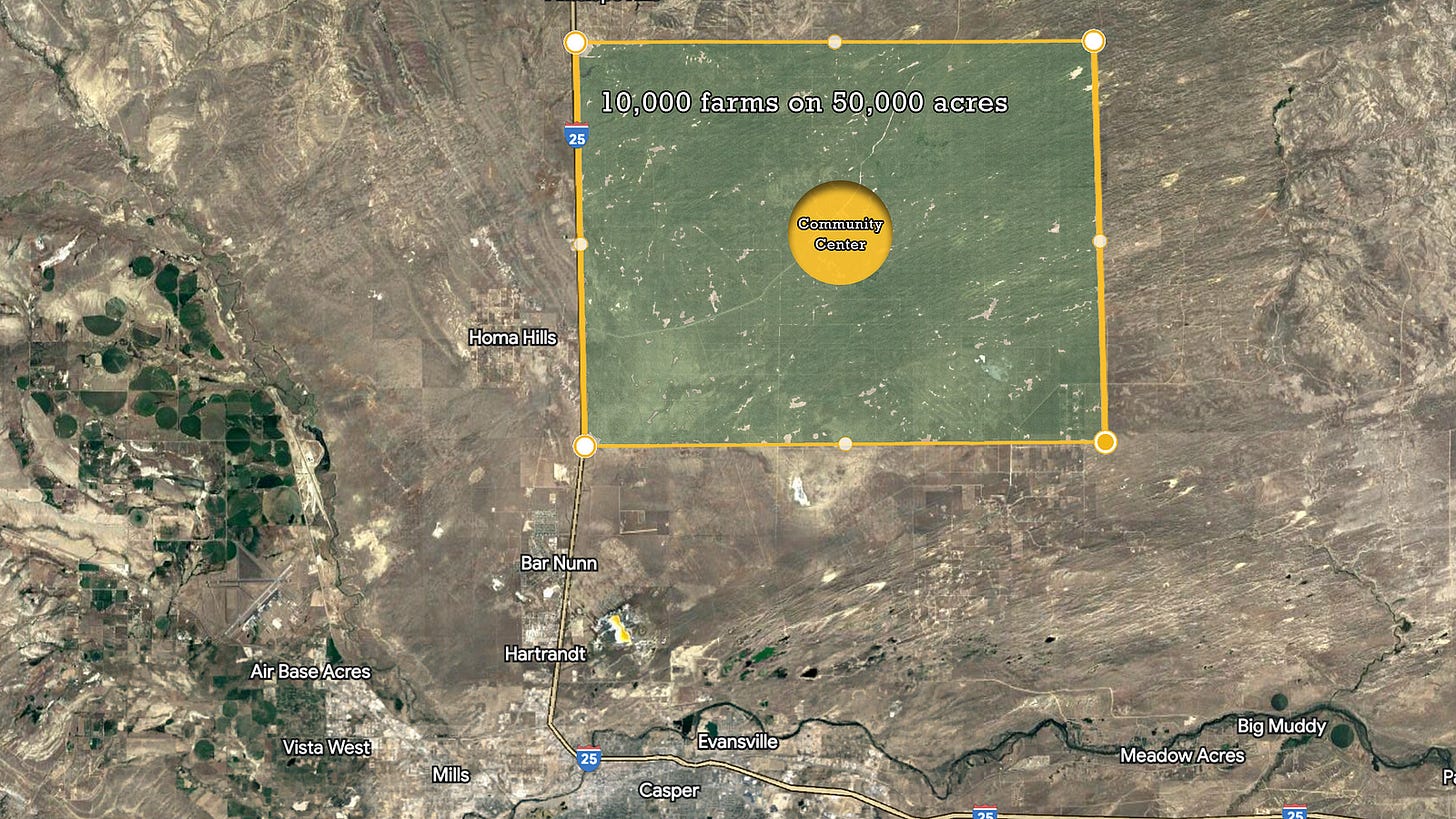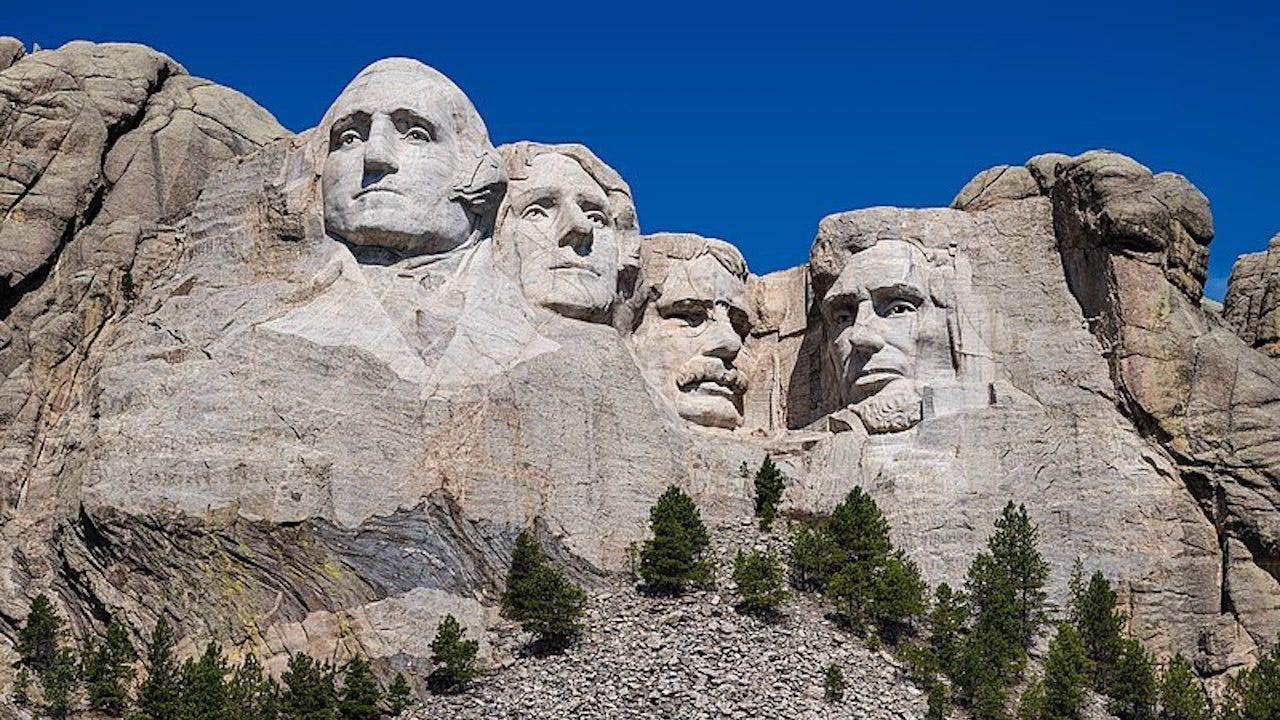Make America a Nation of Yeomen Again
"Vote Yourself a Farm"
America wasn’t so much built by slaves, corporations, or bureaucrats as much as it was built by yeomen.
In the 1800s, 90% of the population lived on farms whereas today it’s about 1%.
I know of no pursuit in which more zeal & important service can be rendered to any country than by improving its agriculture. — George Washington
Cultivators of the earth are the most valuable citizens. They are the most vigorous, the most independent, the most virtuous, and they are tied to their country and wedded to its liberty and interests by the most lasting bonds. As long, therefore, as they can find employment in this line, I would not convert them into mariners, artisans, or anything else. — Thomas Jefferson
Agriculture is our wisest pursuit, because it will in the end contribute most to real wealth, good morals, and happiness. — Thomas Jefferson
The GOP was primarily built for yeomen.
Yes, it was created to stop the extension of slavery, but people vote more out of self-interest than compassion so I’d argue the primary motivation for stopping it was to give western land to free men.
After all, one of the first major pieces of legislation the new Republican Party passed in Congress was the Homestead Act, which would give “a free farm to any man who wanted to put a plow into unbroken sod,” but President James Buchanan [D] vetoed it because it would dilute Democrats’ power and wealth.
It’d dilute their power by increasing the number of Republican-voting yeomen and it’d dilute their wealth because they had so much of it stored in land. Democrats preferred if the federal government slowly sold its land so the increased revenue could be used to reduce tariffs.
The offer of free farms would probably have a powerful effect in encouraging emigration, especially from States like Illinois, Tennessee, and Kentucky, to the west of the Mississippi, and could not fail to reduce the price of property within their limits. An individual in States thus situated would not pay its fair value for land when by crossing the Mississippi he could go upon the public lands and obtain a farm almost without money and without price. — James Buchanan’s veto message of the 1860 Homestead Act
Eastern industrialists also opposed the Homestead Act because it’d dilute their cheap labor source, which just goes to show that industrialists weren’t as central to the GOP as yeomen.
In fact, the only legislation the 1860 GOP platform explicitly cited as need of passage was the Homestead Act, which included a provision that a homesteader couldn’t own slaves, but notice how the bill wasn’t called The Slavery Reduction Act because the populist appeal of free homesteads was inherently more popular with the electorate.
Abraham Lincoln’s 1860 slogan couldn’t have made the party’s intent any more clear: “Vote yourself a farm.”
And then after Honest Abe was elected he fulfilled his promise by signing the bill, which ended up being the most consequential piece of legislation enacted during his presidency (the Emancipation Proclamation wasn’t legislation and the 13th Amendment wouldn’t be enacted until after his death).
Here’s how the Homestead Act worked…
Go find yourself 160 acres.
File a homestead claim (pay fees equal to $18 or $550 in today’s dollars).
Get help from your neighbors and mutual aid societies.
Build a shelter and maintain the land for at least 5 years.
File for your deed. Congratulations, homeowner!
In the end, the Homestead Act had problems with speculation and supply shortages, but nonetheless, it was extremely popular with over 270 million acres of public land, or 10% of the total area of the U.S., given to over 1.6 million people.
The greatest fine art of the future will be the making of a comfortable living from a small piece of land. — Abraham Lincoln
The wild lands of the country should be distributed so that every man should have the means and opportunity of benefitting his condition. — Abraham Lincoln
Theodore Roosevelt who I’d argue was the greatest American president concluded over a semi-century later that the yeoman was still the ideal American…
There is no body of our people whose interests are more inextricably interwoven with the interests of all the people than is the case with the farmers. — Theodore Roosevelt
TR hung the below cartoon above his fireplace where he described its significance to him…
There was one cartoon made while I was President that was always a great favorite of mine. It pictured an old fellow with chin whiskers, a farmer, in his shirt-sleeves, with his boots off, sitting before the fire, reading the President’s Message. On his feet were stockings of the kind I have seen hung up by the dozen in Joe Ferris’s store at Medora, in the days when I used to come in to town and sleep in one of the rooms over the store. The title of the picture was “His Favorite Author.” This was the old fellow whom I always used to keep in mind. He had probably been in the Civil War in his youth; he had worked hard ever since he left the army; he had been a good husband and father; he had brought up his boys and girls to work; he did not wish to do injustice to any one else, but he wanted justice done to himself and to others like him; and I was bound to secure that justice for him if it lay in my power to do so.
But during the 20th century as the number of yeomen shrank so did their political influence within the GOP and America at large.
Some attribute the yeomen’s decline to innovation where they think that large monoculture farms are inherently more efficient than small family-run farms.
Get big or get out. — Earl Butz, Richard Nixon’s Secretary of Agriculture
They think Hamilton’s vision of industrial America naturally won out over Jefferson’s vision and this would be true if large farms were more efficient than small ones since Hamilton valued efficiency over independence, but I don’t think they are.
Did capitalism kill the yeoman?
What destroyed family farms wasn’t that they couldn’t compete on a level playing field, but that our big government gave big corporations so many more competitive advantages.
Small farmers don’t have an army of accountants to navigate our ever-growing regulations and taxes nor do they have an army of lobbyists to optimize tariffs and subsidies nor do they have an army of lawyers to enforce the law against illegal immigration nor do they have an army of marketers to offset government institutions downplaying factory farming’s ecological and health risks nor do they have an army of bankers who can secure super low-interest loans as a way to avoid taxation and hedge against inflation.
If we reduced all these artificial competitive advantages by cutting regulations, taxes, subsidies, dumping, illegal immigration, propaganda, negative externalities, and inflation then at the very least we’d have a much more robust yeomen culture again.
And then to really undo “systemic agrophobia” (to borrow the vernacular of the Left ;) we need a new and improved Homestead Act!
Here’s a general framework…
The government could buy 3 large tracks of land in 3 different parts of the country (i.e. don’t privatize public lands nor use eminent domain) to then contract out the construction of 3 different self-sufficient communities.
Each self-sufficient community should have at least 10,000 5-acre self-sufficient farms.

After they’re built the government could sell 20% of them on the open market while the other 80% would be earned by those who completed 2–4 years of a national service.
In other words, my Homestead Act isn’t as leftwing as the original since you’d have to earn it.
With that said, a lot of the original Homestead Act’s success was based on the fact many Civil War veterans used their government pensions to get their homesteads off the ground.
Prior to arriving at your farm, you’d get free training (there are already too many federal programs that provide agricultural training).
Once you move in, your community would also help you and I’m sure private schools, tools, online courses, and mutual aid societies would pop up to further educate people in the way of the farmer.
After all, if 100 years ago an illiterate tenement dweller could gallop onto an empty lot and start a farm with rudimentary tools then you can succeed in our modern age because as technology improves then maintaining your farm will get easier and easier.
After working your farm for 5 years you’d get your deed.
Congratulations yeoman!
In order to help sustain you during these years and beyond you could also earn supplemental income from the private sector through your labor and investments or at least from the public sector (state-based/community-based job guarantee > welfare).
The worst-case scenario is the 3 self-sufficient communities would flop, but at least we would’ve tried to save humanity from becoming evermore dependent upon large bureaucracies where then hopefully the private sector could learn from our experiment to try in its own way to meet the goal of increasing self-sufficient farming (we spend billions on much less useful experiments, such as determining cocaine’s effects on the sexual habits of quail).
The best-case scenario would be that demand is so high that the 3 self-sufficient communities quickly fill up before they’re even done being built with over a 90% retention/satisfaction rate 5 years later. The government would then contract out the building of more and more self-sufficient communities in order to meet demand so that over time the American farmer would increase from 1% of the population to 5% to 10% to 30%+!
This best-case scenario would mean numerous positives for society…
The economic benefit would be that fewer Americans would need to go into the labor force so it’ll raise wages for everyone.
The political benefit is more Americans would have the freedom to say, “Go f*rm yourself!” to anti-human croynists! Republics work best when no one group has too much power so a large independent population (farmers) would check the more interdependent population (entrepreneurs, corporatists) that would check the more dependent population (welfare recipients, bureaucrats).
The psychological benefit is that by becoming more independent we’d have more pride & joy in being able to stand on our own two feet while also having a greater sense of meaning by belonging to a more close-knit community.
What I’ve put forth here is so common sense that you must ask yourself why hasn’t anyone else proposed this?
It’s because the Left tends to criticize private ownership and the Right tends to criticize government action so We the People stay divided while the powers-that-be continue to amass unprecedented power.
I’ve long believed that one of the mainsprings of our own liberty has been the widespread ownership of property among our people and the expectation that anyone’s child, even from the humblest of families, could grow up to own a business or a corporation. Thomas Jefferson dreamed of a land of small farmers, of shopowners, and merchants. Abraham Lincoln signed into law the Homestead Act that ensured that the great western prairies of America would be the realm of independent, property-owning citizens — a mightier guarantee of freedom is difficult to imagine. — Ronald Reagan
The American Dream can be had again. All it takes is rolling up our sleeves and plowing ahead.





